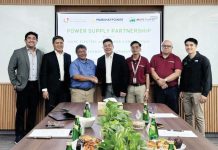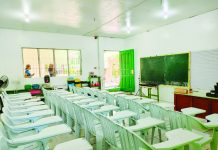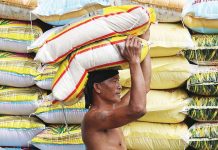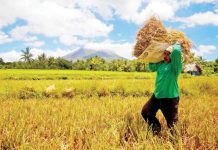
MANILA – Asian Development Bank (ADB)` president Takehiko Nakao on Saturday bared the Manila-based multilateral lender’s top 10 priorities under the long-term Strategy 2030 to achieve a “prosperous, inclusive, resilient, and sustainable” Asia and the Pacific.
“Strategy 2030 will renew our strong commitment to eradicate extreme poverty in the region and expand our vision to achieve a prosperous, inclusive, resilient, and sustainable Asia and the Pacific,” Nakao said in his remarks during the Opening Session of the Board of Governors at the 51st ADB Annual Meeting in Pasig City.
“These aspirations will be aligned with the international agenda such as Sustainable Development Goals and the Paris Agreement on Climate Change,” the ADB chief said.
He said the ADB will pursue differentiated approaches as it recognized different condition in developing partner-countries.
“The country partnership strategy will continue to be the primary platform for defining the ADB’s operational focus in each country,” Nakao said.
The ADB chief highlighted the 10 priorities in the Strategy 2030:
- Tackle remaining poverty and increasing inequalities
- Accelerate progress in gender equality.
- Scale up our support to combat climate change, build climate and disaster resilience, and enhance environmental sustainability
- Build livable cities that are competitive, green, resilient, and inclusive
- Promote rural development and food security.
- Strengthen governance
- Foster regional cooperation and integration
- Mobilize private sector resources
- Further strengthen ADB’s role as “provider and facilitator of knowledge”
- Modernize as new strategy requires a stronger, better, and faster ADB
To reduce poverty and inequalities in the region, Nakao said ADB will help create quality jobs, promote secondary and tertiary education, expand universal healthcare, strengthen social protection programs.
“We will focus on lagging areas and pockets poverty even in middle income countries,” he said.
For the second priority on accelerating progress in gender equality, Nakao said the ADB will continue to incorporate gender elements “when we design and implement projects and programs.”
“We will support of gender-focused projects in education, health, and financial inclusion. We will promote gender equality in decision making through our projects and technical assistance,” Nakao said.
To scale up support to combat climate change, he said, the ADB will help countries achieve their nationally-determined contributions under the Paris Agreement.
“We will invest in the conservation and reservation of natural capital. We will improve the water-food- energy nexus,” Nakao said.
On building livable cities that are competitive, green, resilient, and inclusive, he said the ADB will support multi-modal mass public transport systems in cities, clean water and sanitation, and urban health facilities.
“ADB will help cities expand sources of funding and enhance inclusive, integrated, and participatory urban planning,” the lender’s chief said.
In promoting rural development and food security, the lender will focus on developing agricultural value chains from farm to market through investment in rural roads, storage facilities, and mobile connectivity.
“We will foster advance technologies in farming,” according to Nakao.
In strengthening governance of partner countries, the ADB will support public sector management reforms through policy-based lending and dialogue.
“ADB will help governments enhance their capacity to prepare, implement, and operate high-quality projects,” Nakao said.
“ADB will help raise standards globally for environmental and social safeguards, sound financial management, and anti-corruption,” he added.
To foster regional cooperation and integration, Nakao said the ADB will build on its experience on sub-regional cooperation initiatives since the 1990s in Central Asia, South Asia, Southeast Asia, and the Pacific.
“We will promote regional public goods such as transportation and logistical networks and protection against communicable diseases. We will support regional approach to energy security, education, tourism, and financial stability,” the ADB chief said.
“ADB will cooperate with existing and emerging international initiatives,” Nakao added.
For its eighth priority of mobilizing private sector resources to meet the region’s huge development financing needs, Nakao said the ADB’s private sector operations “help fill market gaps and promote participations in infrastructure and other development finance.”
“We will further scale up our private sector operations. Widen their geographic coverage including new and frontier markets and expand operations in social sectors such as health and education,” he said.
“We will also continue to promote the effective use of public-private partnerships with the enhanced resource mobilization through credit enhancement operations and cofinancing with bilateral and multilateral partners,” he added.
The ADB will also strengthen its role as a “provider and facilitator of knowledge” as among its top priorities under the Strategy 2030, according to Nakao.
“I strongly believe that ADB’s value addition is combining finance with knowledge, whether tacit or explicit. We will develop and deliver integrated solutions that extend across sectors. ADB’s knowledge work will strengthen the network of scholars and think tanks in Asia and beyond, and offer Asian perspectives,” he said.
Nakao said implementing the new Strategy 2030 will require a stronger, better, and faster ADB. We will continue to use our financial resources efficiently and creatively.
“We will invest in our workforce, promote diversity including gender balance, and ensure a respectful workplace. We will expand our presence on the ground. We will dramatically modernize business processes to speed up our services to clients,” he said.
Nakao said the ADB intends to complete Strategy 2030 by mid 2018.
“We already held extensive consultations. I appreciate the guidance from Governors at this Meeting. We will continue to seek views from various stakeholders, including civil society organizations,” he said.
“Our task ahead is to reinvent ADB and meet the challenges of a transforming Asia and the Pacific,” he added.
Nakao also mentioned a Filipino proverb, “Kung may tinanim, may aanihin” as he urged partner countries to work together and continue the journey to achieve a prosperous, inclusive, resilient, and sustainable Asia and the Pacific. (GMA News)







